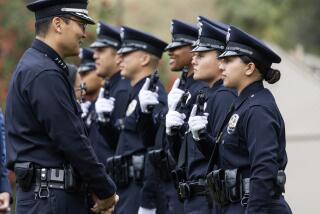Who’ll Police the Police When It Comes to Brutality?
- Share via
In a perverse way, the airing of America’s Unfunniest Home Video--the L.A. police beating March 3 of Rodney King--may do some good.
Whenever myths are destroyed, ideas sometimes step into the void. Speaking of myths, is there anyone still out there who doesn’t accept the sad fact that cops sometimes go nuts on the job? Are there still people who think citizens, usually minority citizens, are always making up their stories when they complain about police brutality?
We know that we never would have heard of Rodney King but for that video. He would have been another palooka resisting arrest. We also know from police transcripts that the cops talked almost casually about the incident afterward.
The King video is most chilling because it forces us to see the dirty underside of our institutions. The criminal element in society is scary enough . . . we have to worry about the cops too?
It’s easy for L.A. Police Chief Daryl Gates to talk about the King beating as an aberration. However, if home-video cameras were as small and usable as, say, wristwatches, Gates would have to invent another line of defense.
Far from accepting that this was an aberration, I found myself thinking: Was the King incident the only one that night?
That level of cynicism is fostered by the kind of scene that unfolded a few weeks ago in downtown Los Angeles near the Music Center. I overheard a cop tell a panhandler in a wheelchair to move along. When the man balked, the cop said: “I can (expletive deleted) hurt you.”
“You can (expletive deleted) hurt me?” the guy said, disbelievingly. “I’m in a wheelchair, and you’re gonna hurt me?”
The point isn’t to bash cops. It’s just to accept the fact that, for whatever reasons, law enforcement can get out of control. And given the system, it’s difficult for anyone to bring such things to light.
People simply don’t trust police departments or sheriff’s departments to investigate their own people.
Which brings us to our geography lesson.
Los Angeles isn’t that far away from Orange County.
With 2.4 million people, Orange County is urbanizing before our very eyes. Society is becoming more complicated by the day. The pressures and dangers for police and sheriff’s deputies will grow accordingly. So, too, will the temptations to let off steam on the job, a la the LAPD.
In Orange County, the authorities could take a preemptive step against the possibility of future Rodney King episodes.
The county and city governments should set up an independent commission with the authority to review any allegation of harassment or excessive force by the Sheriff’s Department or police departments. Instead of having to file a complaint with the police or Sheriff’s Department, which many citizens are reluctant to do, they could take their case to the commission. Currently, the district attorney’s office routinely reviews complaints about excessive force, but the relationship between the district attorney’s office and law enforcement has always been considered more cozy than independent.
The review panel would collect information from both sides and try to find the truth. Its findings wouldn’t have to have binding legal status; rather, the commission would create its own power by the impartiality and credibility of its work. That credibility would then translate into weight with the public and create pressure for jurisdictions to act.
Obviously, not all cases could be easily resolved, but even serving solely as an advisory group, the commission would give the public some confidence that its complaints don’t disappear into a black hole. In knowing that an outside group might someday review excessive-force allegations, it would also keep police departments on their toes, while not precluding them from conducting their own internal investigations.
Commission members could be appointed by the Board of Supervisors--retired judges and schoolteachers come to mind as good appointees--and convene only when a case of significant proportion occurred. A major requirement should be that no grandstanders or people with political agendas be allowed to serve.
If nothing else, an independent police review commission would send a signal that we play a different ballgame down here than they do in Los Angeles. It would restore public confidence already shaken by watching the worst TV rerun ever--the King incident.
We ask a lot of law enforcement. As with baseball umpires, we demand that cops be perfect their first day on the job and then steadily improve.
History has shown they don’t always police themselves. Another set of eyes and ears is needed.
We need an independent police commission.
Who knows, maybe it would prove what instant replay in baseball often does--that cops, like umpires, are right most of the time.
Or, in the best-case scenario, we’d have a commission that never had to convene itself.
More to Read
Sign up for Essential California
The most important California stories and recommendations in your inbox every morning.
You may occasionally receive promotional content from the Los Angeles Times.










